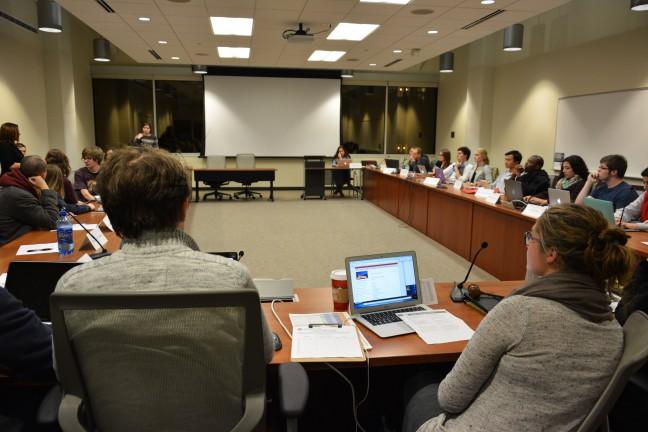With University of Wisconsin’s student conduct code regarding sexual assault undergoing major revisions, the dean’s office looked to student government’s largest governing body for support Wednesday.
Associate Dean of Students Kevin Helmkamp and Assistant Dean Tanya Schmidt met with Associated Students of Madison’s Student Council to address the need for student voice in discussions of upcoming policy changes.
Chapter 17 is the student non-academic misconduct policy upholding university standards dealing with issues of violence, discrimination and sexual assault.
Helmkamp said Chapter 17 is currently undergoing a complex revision process that will improve the code and also lead to students playing a more active role.
“Looking through the student perspective and having that lens is important, rather than just hearing from faculty and staff,” Helmkamp said.
Both Helmkamp and Schmidt have fought hard for the use of student panels in sexual assault cases.
Schmidt said the panelists are selected from ASM, Faculty Senate and the Academic Staff Assembly. Anyone who is trained to serve on the panel can be selected for a case. The ratio is one student and two faculty or staff members, with all votes weighed equally.
Schmidt emphasized the entire UW System needs to weigh in and receive feedback for the revisions of the code. She said it is important for all students to understand the code because they need to know the expectations for themselves.
The last time Chapter 17 was revised was in 2009.
Schmidt said one change includes using state definitions for words like “stalking,” “rape,” “consent” and “domestic violence.” The code also lacks specificity and does not have a section on dating violence, Schmidt said.
Schmidt also addressed the mandatory reporting obligation for sexual assault. She said when a student comes to the Dean of Students Office, staff members are obligated to report the assault if they receive information about who may be involved or where the assault may have happened. If a student does not have to move forward immediately with a case, they can go to places such as the health center or EVOC, which are not obligated to report. Schmidt said this helps students to examine all of their options fully.
ASM Chair Genevieve Carter posed a question regarding how the interactions between the complainant and the respondent would be. Schmidt responded, saying the only interaction required is in the hearing.
She said complainants have the decision to participate however they want to. They can choose if they want to attend the hearing in person, or call in using a phone or Skype. This is important so the complainant and respondent do not have to be in physical proximity with each other, she said.
She also clarified the choice to not attend the hearing in person does not negatively affect the outcome of the panel’s decision, and described how the panel is specifically trained on how traumatic this experience can be for individuals involved.
She said this training has a strong focus on confidentiality. She said each member on the panel goes through a misconduct training process before they can participate in a case. She also said they have the option to excuse themselves from the panel if they feel uncomfortable being involved.













